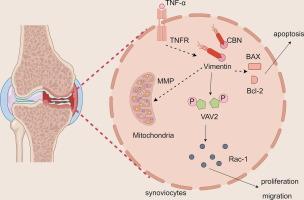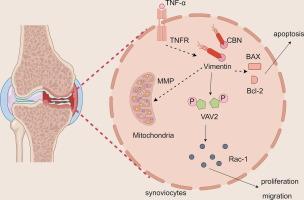Columbianadin ameliorates rheumatoid arthritis by attenuating synoviocyte hyperplasia through targeted vimentin to inhibit the VAV2/Rac-1 signaling pathway
IF 13
1区 综合性期刊
Q1 MULTIDISCIPLINARY SCIENCES
引用次数: 0
Abstract
Introduction
Rheumatoid arthritis (RA) is an autoimmune disease pathologically characterized by synovial inflammation. The abnormal activation of synoviocytes seems to accompany the progression of RA. The role and exact molecular mechanism in RA of columbianadin (CBN) which is a natural coumarin is still unclear.
Objectives
The present research aimed to investigate the effect of vimentin on the abnormal growth characteristics of RA synoviocytes and the targeted regulatory role of CBN.
Methods
Cell migration and invasion were detected using the wound healing and transwell method. Mechanistically, the direct molecular targets of CBN were screened and identified by activity-based protein profiling. The expression of relevant proteins and mRNA in cells and mouse synovium was detected by western blotting and qRT-PCR. Changes in the degree of paw swelling and body weight of mice were recorded. H&E staining, toluidine blue staining, and micro-CT were used to visualize the degree of pathological damage in the ankle joints of mice. Small interfering RNA and plasmid overexpression of vimentin were used to observe their effects on MH7A cell proliferation, migration, apoptosis, and downstream molecular signaling.
Results
The TNF-α-induced proliferation and migration of MH7A cells could be significantly repressed by CBN (25,50 μM), and the expression of apoptosis and autophagy-associated proteins could be modulated. Furthermore, CBN could directly bind to vimentin and inhibit its expression and function in synoviocytes, thereby ameliorating foot and paw swelling and joint damage in CIA mice. Silencing and overexpression of vimentin might be involved in developing RA synovial hyperplasia and invasive cartilage by activating VAV2 phosphorylation-mediated expression of Rac-1, which affects abnormal growth characteristics, such as synoviocyte invasion and migration.
Conclusion
CBN-targeted vimentin restrains the overactivation of RA synoviocytes thereby delaying the pathological process in CIA mice, which provides valuable targets and insights for understanding the pathological mechanisms of RA synovial hyperplasia.


通过靶向波形蛋白抑制 VAV2/Rac-1 信号通路,减轻滑膜细胞增生,从而改善类风湿性关节炎的病情
导言类风湿性关节炎(RA)是一种以滑膜炎症为病理特征的自身免疫性疾病。滑膜细胞的异常活化似乎伴随着类风湿性关节炎的进展。本研究旨在探讨波形蛋白对 RA 滑膜细胞异常生长特征的影响以及 CBN 的靶向调控作用。方法采用伤口愈合法和转孔法检测细胞迁移和侵袭。从机理上讲,CBN的直接分子靶标是通过基于活性的蛋白质谱分析筛选和确定的。细胞和小鼠滑膜中相关蛋白质和 mRNA 的表达通过 Western 印迹和 qRT-PCR 进行检测。记录了小鼠爪肿胀程度和体重的变化。H&E染色、甲苯胺蓝染色和显微CT用于观察小鼠踝关节的病理损伤程度。结果 CBN(25、50 μM)能显著抑制 TNF-α 诱导的 MH7A 细胞增殖和迁移,并能调节细胞凋亡和自噬相关蛋白的表达。此外,CBN 还能直接与波形蛋白结合,抑制其在滑膜细胞中的表达和功能,从而改善 CIA 小鼠的足、爪肿胀和关节损伤。结论CBN靶向波形蛋白可抑制RA滑膜细胞的过度激活,从而延缓CIA小鼠的病理过程,这为了解RA滑膜增生的病理机制提供了有价值的靶点和见解。
本文章由计算机程序翻译,如有差异,请以英文原文为准。
求助全文
约1分钟内获得全文
求助全文
来源期刊

Journal of Advanced Research
Multidisciplinary-Multidisciplinary
CiteScore
21.60
自引率
0.90%
发文量
280
审稿时长
12 weeks
期刊介绍:
Journal of Advanced Research (J. Adv. Res.) is an applied/natural sciences, peer-reviewed journal that focuses on interdisciplinary research. The journal aims to contribute to applied research and knowledge worldwide through the publication of original and high-quality research articles in the fields of Medicine, Pharmaceutical Sciences, Dentistry, Physical Therapy, Veterinary Medicine, and Basic and Biological Sciences.
The following abstracting and indexing services cover the Journal of Advanced Research: PubMed/Medline, Essential Science Indicators, Web of Science, Scopus, PubMed Central, PubMed, Science Citation Index Expanded, Directory of Open Access Journals (DOAJ), and INSPEC.
 求助内容:
求助内容: 应助结果提醒方式:
应助结果提醒方式:


